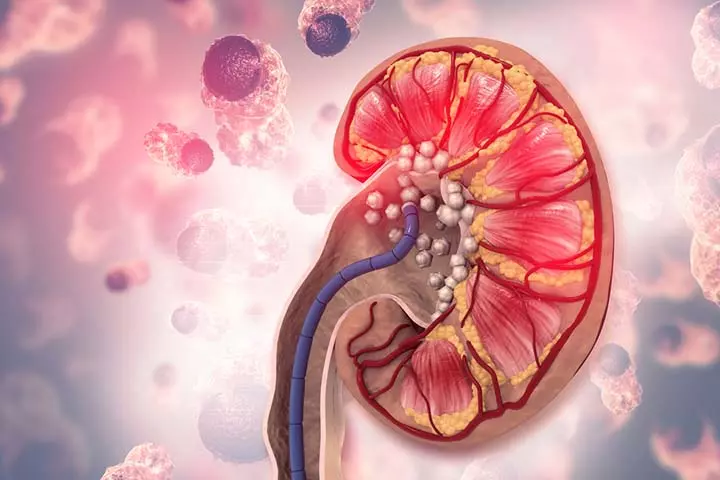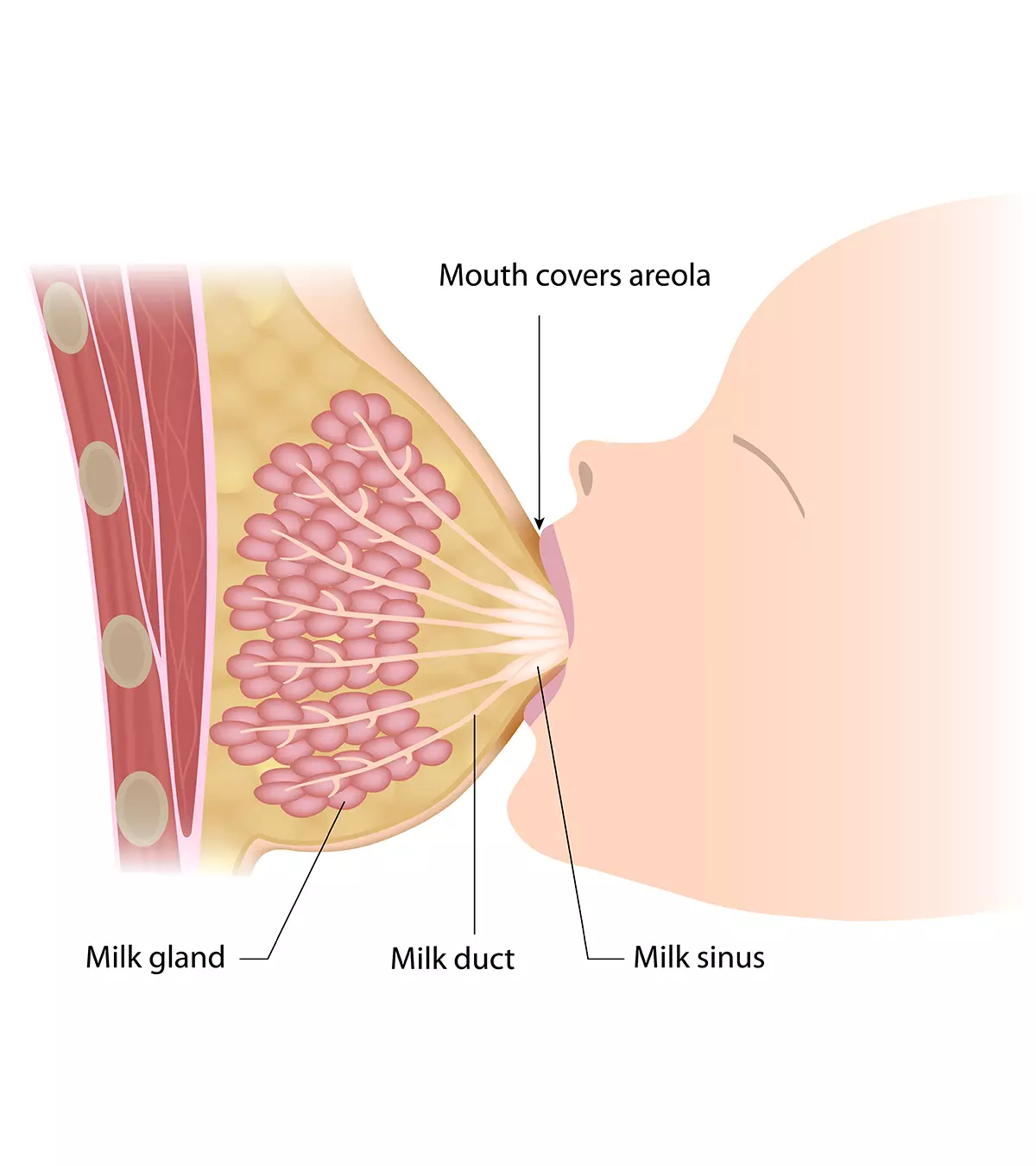
Image: ShutterStock
Some women experience fluid retention during breastfeeding and are given hydrochlorothiazide to relieve the discomfort. However, most lactating women may be concerned about the effects of hydrochlorothiazide when breastfeeding.

Since the drug is a diuretic and works effectively to reduce swelling in the body, doctors usually prescribe it. Hydrochlorothiazide passes in the breast milk, but in low doses, it does not cause any adverse effects on the baby. However, it is necessary to discuss your concerns about the medication’s safety with your doctor before using it. Read this post to learn more about the benefits and side effects of hydrochlorothiazide during breastfeeding and the safe doses recommended for lactating women.
Key Pointers
- Hydrochlorothiazide is a medication used to treat water retention, which helps reduce excess accumulation of fluids and swelling in the body during breastfeeding.
- Low doses of hydrochlorothiazide are safe to consume while breastfeeding and do not inhibit lactation, despite the drug passing into the milk.
- The medication can also treat kidney stones, promote weight loss, and treat diabetes and hypertension by minimizing water retention.
- Hydrochlorothiazide has several side effects, including muscle weakness, cramps, thirst, dizziness, nausea, breathing difficulty, and unusual bleeding.
What Is Hydrochlorothiazide (HCTZ)?

Hydrochlorothiazide, or Microzide, is a medication that treats water retention effectively. The drug is popular as a diuretic and helps reduce excess accumulation of fluid and swelling in your body while you are breastfeeding. Hydrochlorothiazide also treats high blood pressure and other health conditions effectively (1).
Is It Safe To Have Hydrochlorothiazide (HCTZ) While Breastfeeding?

Yes! It is safe to have hydrochlorothiazide while breastfeeding, but remember to take only at the doses and frequency prescribed by your doctor. You can have a low dose, such as 50 milligrams or even less than that, as per your doctor’s suggestion daily while nursing your newborn. Even though the drug passes into breast milk, its low concentration does not adversely affect infant health. Also, low-dose hydrochlorothiazide does not alter the milk composition or inhibit milk production. Since the medication has been found to reach its peak in breast milk about 3 hours after a 50mg oral dose, having the medication just before the longest interval of your infant’s sleep reduces the amount of the drug’s transfer to your newborn (7). However, make sure you have a word with your doctor and have only prescribed doses of the medication to prevent the risk of potential adverse effects while nursing.
 Point to consider
Point to considerHydrochlorothiazide Breastfeeding – The Health Benefits
There are many health benefits of having the right doses of hydrochlorothiazide while nursing your newborn. Benefits include:
1. Minimizes water retention
Being a diuretic, hydrochlorothiazide reduces water accumulation in your body while you are nursing your infant. The drug helps prevent the risk of all health hazards such as pain, inflammation, soreness, and other health conditions resulting due to water retention in your body. The medication is highly effective in curing edema resulting due to cirrhosis of the liver. Also, the drug prevents fluid accumulation and swelling in your body due to congestive heart failure, corticosteroid medications, and nephritic syndrome (2).
2. Treats kidney stones

Hydrochlorothiazide is an effective treatment for health troubles resulting due to kidney stones. The drug minimizes the amount of calcium that kidneys excrete through the urine. Also, the medicine minimizes the amount of calcium available in your body that handles the formation of kidney stones while breastfeeding (3).
3. Promotes weight loss
As hydrochlorothiazide eliminates the excess of fluid retention and the risk of swelling in your body, it helps promote weight loss. So, having the medication helps you cast off the excess of pounds while nursing your dear little one (4).
4. Treats diabetes insipidus
Hydrochlorothiazide is a diuretic, so it is highly effective in treating diabetes insipidus, a rare type of diabetes resulting due to the deficiency of the pituitary hormone vasopressin that controls renal function (2).
5. Treats hypertension

Hydrochlorothiazide treats hypertension while breastfeeding. Having 12.5 mg to 50 mg dose of the drug helps lower your high blood pressure effectively. Seek medical consultation to know the right amount of low-dose prescription of the drug (5).
Side Effects Of Hydrochlorothiazide (HCTZ) While Breastfeeding

Although there are several health benefits of having hydrochlorothiazide while breastfeeding, excess or inappropriate amounts of the drug can make you suffer from its side effects. Potential side effects are (6):
- Muscle weakness
- Cramps
- Thirst
- Skin sensitivity
- Dizziness
- Pain in stomach
- Nausea
- Vomiting
- Fever
- Headache
- Loss of appetite
- Hair loss
- Diarrhea
- Rash
- Difficulty in breathing
- Unusual bleeding
- Sore throat
Additionally, higher doses of hydrochlorothiazide can cause electrolyte imbalance, leading to conditions like hypokalemia, hyponatremia, hypomagnesemia, hypercalcemia, and hyperchloremic alkalosis. In patients with preexisting diabetes mellitus, hydrochlorothiazide (HCTZ) can lead to HCTZ-induced hyperglycemia. Some other adverse effects of hydrochlorothiazide includes (9):
- Gout flares if has a history of gout
- Dyslipidemia
- Sulfa allergy if you have preexisting sulfonamide allergy
- Hyponatremia or hepatic encephalopathy in patients with cirrhosis
- In rare cases, hydrochlorothiazide may also cause vision problems, such as glaucoma and transient myopia
 Caution
CautionFrequently Asked Questions
1. Can hydrochlorothiazide cause any long-term effects on my baby?
Maternal administration of the drug is not associated with any long-term effects in babies. Overdose due to not following the prescription may reduce breast milk supply, indirectly affecting the baby’s nutrient intake. A high dose of 100mg hydrochlorothiazide daily in the morning and 50mg in the afternoon or 50mg twice daily have been shown to suppress breast milk production in postpartum mothers (7).
2. Can hydrochlorothiazide cause any allergic reactions in my baby?
There is no significant evidence of breastfeeding infants showing allergic reactions to maternal hydrochlorothiazide dosage. Nevertheless, the medicine is also administered among pediatric patients, and in these cases, allergies may occur. Allergic symptoms include skin rash, hives, blisters, and difficulty breathing or swallowing (8). Infants exposed to the drug through breast milk may display these symptoms if they are allergic to the drug.
3. Can hydrochlorothiazide affect my baby’s immune system?
There is no evidence that maternal administration of hydrochlorothiazide during lactation can affect a breastfeeding baby’s immunity.
4. Can hydrochlorothiazide cause any digestive problems in my baby?
It is not known if maternal hydrochlorothiazide administration can cause digestive problems in babies. The direct administration of the drug to children may sometimes cause digestive problems as side effects. These might occur in babies due to exposure to the drug through breast milk. Digestive problems include constipation, diarrhea, stomach pain, vomiting, decreased appetite, and cramps (8).
5. Can hydrochlorothiazide cause any behavioral changes in my baby?
There is no scientific evidence regarding the potential behavioral changes in breastfeeding babies due to maternal hydrochlorothiazide use.
6. Can I take hydrochlorothiazide with other medications while breastfeeding?
Hydrochlorothiazide may interact with certain medications, including hydrocortisone, potassium supplements, and NSAIDs such as ibuprofen. Inform your doctor about any other medications or supplements you are on to minimize potential risks (6).
7. What alternatives can be considered if hydrochlorothiazide is not well-tolerated while breastfeeding?
Chlorothiazide is generally considered a safer alternative to hydrochlorothiazide in breastfeeding women. While a dose of 50mg or less of hydrochlorothiazide is considered safe in lactation, studies have shown that even after a single 500mg oral dose of chlorothiazide, no amount of the drug was traced in the breast milk in three hours (7) (10). Some other hypertensive drugs safer for breastfeeding women include spironolactone, calcium channel blockers (amlodipine, diltiazem), ACE inhibitors (captopril, enalapril), and beta blocking drugs (labetalol) (11).
If you have fluid retention or swelling in your body, you can safely take the diuretic Hydrochlorothiazide while breastfeeding. It can also help with hypertension, kidney stones, weight loss, and diabetes insipidus. Although HCTZ passes into breast milk, the amount is not enough to harm your baby, and it does not restrict or impair nursing in mothers. However, before taking the drug while nursing, it is advisable to visit your doctor to avoid any adverse maternal health effects such as muscular cramps, stomach pain, headaches, and thirst.
Infographic: Potential Adverse Effects Of Hydrochlorothiazide For Nursing Mothers
Hydrochlorothiazide is a diuretic used for treating hypertension and fluid retention. It is excreted in breast milk and its benefits during breastfeeding should be calculated against the risks. The infographic below lists the possible adverse effects of the drug in lactating women.
Some thing wrong with infographic shortcode. please verify shortcode syntax
Illustration: Hydrochlorothiazide Breastfeeding Considerations

Image: Stable Diffusion/MomJunction Design Team
Learn about hydrochlorothiazide, its nursing considerations, side effects, and mechanism of action in this informative video. Get the facts to make an informed decision about your health.
References
- Hydrochlorothiazide Tablets Usp 12.5 Mg 25 Mg And 50 Mg.
https://www.accessdata.fda.gov/drugsatfda_docs/label/2011/040735s004,040770s003lbl.pdf - Hydrochlorothiazide.
https://medlineplus.gov/druginfo/meds/a682571.html - Ali Tehranchi et al. (2014); Effects of hydrochlorothiazide on kidney stone therapy with extracorporeal shock wave lithotripsy.
https://www.ncbi.nlm.nih.gov/pmc/articles/PMC4127856/ - Amy B Cadwallader et al.; (2010); The abuse of diuretics as performance-enhancing drugs and masking agents in sport doping: pharmacology toxicology and analysis.
https://www.ncbi.nlm.nih.gov/pmc/articles/PMC2962812/ - Spironolactone and Hydrochlorothiazide.
https://medlineplus.gov/druginfo/meds/a601111.html - Amiloride and Hydrochlorothiazide.
https://medlineplus.gov/druginfo/meds/a601014.html - Hydrochlorothiazide.
https://www.ncbi.nlm.nih.gov/books/NBK500965/ - Hydrochlorothiazide: Pediatric Medication; Memorial Sloan Kettering Cancer Center.
https://www.mskcc.org/cancer-care/patient-education/medications/pediatric/ibuprofen - Linda L. Herman et al.; (2025); Hydrochlorothiazide.
https://www.ncbi.nlm.nih.gov/books/NBK430766/ - Chlorothiazide.
https://www.ncbi.nlm.nih.gov/books/NBK501520/ - Philip O. Anderson; (2018); Treating Hypertension During Breastfeeding.
https://www.liebertpub.com/doi/pdf/10.1089/bfm.2017.0236
Community Experiences
Join the conversation and become a part of our nurturing community! Share your stories, experiences, and insights to connect with fellow parents.
Read full bio of Dr. Misha Yajnik
Read full bio of Jessica Albert
Read full bio of Rohit Garoo
Read full bio of Vidya Tadapatri


















